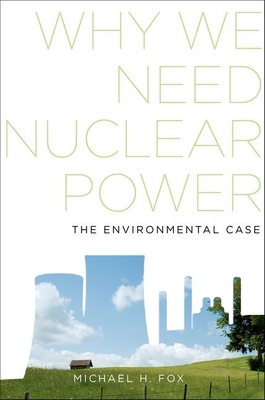An argument for nuclear power as an environmentally sound option, based on real science and written by a radiation biologist. A complete scientific analysis of nuclear power.
The issue of nuclear power has become a polarizing one, especially in light of the increasing need for sustainable energy sources, and events like the 2011 nuclear disaster in Japan. The public has been largely wary and even fearful of a reliance on nuclear power, pointing to the reactor meltdown in Chernobyl or the Three-Mile Island accident as evidence that nuclear power is an unfeasible and dangerous source of energy. However, with these fears come misconceptions about the science behind nuclear power, and many arguments made against it lack the scientific grounding needed to contribute to the debate. At the same time, clean-energy sources like wind and solar have failed to prove that they can be used on a large enough scale to be relied upon. In Why We Need Nuclear Power: The Environmental Case, experienced radiation biologist Michael H. Fox replaces the misconceptions about nuclear power with real science, and argues that it may be the best source of energy both for large-scale use and slowing the effects of global warming. Fox relies on thirty-five years of experience studying the biological effects of radiation to explore the issues surrounding nuclear power, addressing which of the public''s concerns on the issue are valid, and which are unsupported by science. He shows that nuclear power has crucial strategic importance in reducing the large amounts of carbon dioxide released into the atmosphere by burning fossil fuels. This is the first book to lay out clearly what we know about the biological effects of radiation, and what science we use to know it. Why We Need Nuclear Power is a critical resource for anyone looking to understand the facts of the nuclear power issue, and what role nuclear power could play in reducing the environmental impact of the world''s energy consumption.
Get Why We Need Nuclear Power by at the best price and quality guranteed only at Werezi Africa largest book ecommerce store. The book was published by Oxford University Press Inc and it has pages. Enjoy Shopping Best Offers & Deals on books Online from Werezi - Receive at your doorstep - Fast Delivery - Secure mode of Payment
 Jacket, Women
Jacket, Women
 Woolend Jacket
Woolend Jacket
 Western denim
Western denim
 Mini Dresss
Mini Dresss
 Jacket, Women
Jacket, Women
 Woolend Jacket
Woolend Jacket
 Western denim
Western denim
 Mini Dresss
Mini Dresss
 Jacket, Women
Jacket, Women
 Woolend Jacket
Woolend Jacket
 Western denim
Western denim
 Mini Dresss
Mini Dresss
 Jacket, Women
Jacket, Women
 Woolend Jacket
Woolend Jacket
 Western denim
Western denim
 Mini Dresss
Mini Dresss
 Jacket, Women
Jacket, Women
 Woolend Jacket
Woolend Jacket
 Western denim
Western denim
 Mini Dresss
Mini Dresss






























































